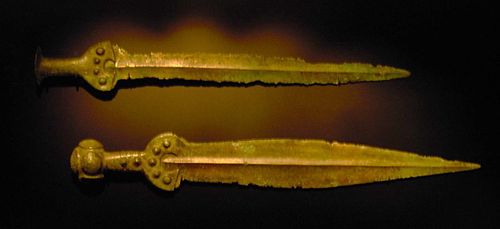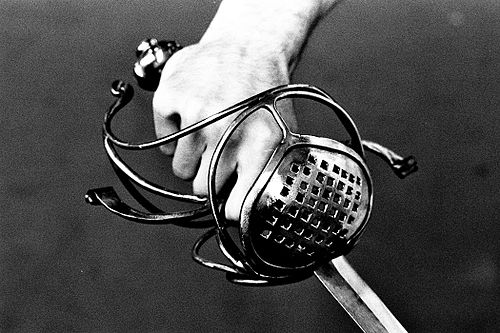Swordnoun
(weaponry) A long-bladed weapon with a hilt, and usually a pommel and cross-guard, which is designed to stab, slash, and/or hack.
Swordnoun
(tarot) A suit in the minor arcana in tarot.
Swordnoun
(tarot) A card of this suit.
Swordnoun
(weaving) One of the end bars by which the lay of a hand loom is suspended.
Swordnoun
(heraldry) The weapon, often used as a heraldic charge.
Swordnoun
An offensive weapon, having a long and usually sharp-pointed blade with a cutting edge or edges. It is the general term, including the small sword, rapier, saber, scimiter, and many other varieties.
Swordnoun
Hence, the emblem of judicial vengeance or punishment, or of authority and power.
Swordnoun
Destruction by the sword, or in battle; war; dissension.
Swordnoun
The military power of a country.
Swordnoun
One of the end bars by which the lay of a hand loom is suspended.
Swordnoun
a cutting or thrusting weapon with a long blade
Sword
A sword is an edged, bladed weapon intended for manual cutting or thrusting. Its blade, longer than a knife or dagger, is attached to a hilt and can be straight or curved.
Rapiernoun
A slender, straight, sharply pointed sword (double-edged, single-edged or edgeless).
Rapieradjective
Extremely sharp.
Rapieradjective
Cutting smarts or keen wit.
Rapiernoun
A straight sword, with a narrow and finely pointed blade, used only for thrusting.
Rapiernoun
a straight sword with a narrow blade and two edges
Rapier
A rapier () or espada ropera is a type of sword with a slender and sharply-pointed two-edged blade that was popular in Western Europe, both for civilian use (dueling and self-defense) and as a military side arm, throughout the 16th and 17th centuries. Important sources for rapier fencing include the Italian Bolognese group, with early representatives such as Antonio Manciolino and Achille Marozzo publishing in the 1530s, and reaching the peak of its popularity with writers of the early 1600s (Salvator Fabris, Ridolfo Capo Ferro).





































